Diplomatic Bluebook 2022
Chapter 2
Japan's Foreign Policy by Region
2 Regional Situations in Europe
(1) The European Union (EU)
The EU is a political and economic union consisting of 27 member states with a total population of about 447 million. Sharing fundamental values and principles, the EU is an important partner for Japan in addressing global issues.
<Recent Developments of the EU>
For the EU, responding to COVID-19 remained a major challenge in 2021 continuing on from 2020. The European Commission, the executive body of the EU, had been procuring vaccines in bulk for EU member states. However, due to delays in supply from pharmaceutical companies, the Commission began applying the transparency and authorisation mechanism for exports of COVID-19 vaccines from January 30. The EU has stated that the mechanism, which was initiated amidst the growing trend to secure supply of vaccines for one's own country centered on developed countries, is not an export ban but rather a temporary system that requires approval from member states for exports to third countries to ensure transparency in vaccine exports outside the EU, and conforms with the EU's international commitments under the WTO and the G20. Although vaccine supplies within the EU have stabilized since spring, the mechanism was extended three times and remained in place until December 31. The stabilization of vaccine supply has led to a sharp increase in the vaccination rate in the EU. On August 31, the European Commission announced that 70% of the adult population in the region has been fully vaccinated, achieving the target set at the beginning of the year. On the other hand, looking at the vaccination rates in individual EU member states, there is a clear disparity between Eastern and Western Europe, with low vaccine coverage particularly in Eastern European countries.
With the increase in vaccination rates, some EU member states started to resume economic activities in May. On May 20, the EU revised its recommendations on border control into the EU, announcing a direction to allow vaccinated people to enter the EU and relaxing the criteria on third countries for allowing travel from outside the EU.
In addition, as a move toward Europe's economic recovery, the EU's recovery instrument, NextGenerationEU, was launched in January 2021 to support economic recovery from the COVID-19 pandemic and work on measures to create a greener, more digital, and resilient future. As for the Recovery and Resilience Facility (RRF), which is at the core of NextGenerationEU, 22 member countries have completed the EU approval process for their country's own recovery and resilience plan and advance payments of the requested funds have begun (as of March 1, 2022).
While working on its response to COVID-19, the EU released the EU Strategy for Cooperation in the Indo-Pacific in April followed by the Joint Communication on the EU Strategy for Cooperation in the Indo-Pacific in September, which further elaborates on the Strategy released in April. The Joint Communication released in September mentions China's growing military power in the Indo-Pacific and increasing tensions in the East and South China Seas and the Taiwan Strait. It also states that the EU will advance cooperation with its partners in the Indo-Pacific in seven priority areas: the economy, climate change, ocean governance, the digital field, connectivity, security and defense, and human security. Japan was mentioned as a partner for cooperation in all of these areas. Moreover, in July, the EU released a new document on EU connectivity titled “A Globally Connected Europe,” and in December, the EU announced its “Global Gateway” to embody its connectivity strategy and to support quality infrastructure development.
<Japan-EU Relations>
Japan and the EU are strengthening their cooperation under the Japan-EU EPA, which entered into force in February 2019, and the Japan-EU Strategic Partnership Agreement (SPA), of which provisional application started at the same time. In May 2021, Prime Minister Suga held the Japan-EU Summit (in the teleconference format) with President Michel of the European Council and President von der Leyen of the European Commission. During the Summit, they exchanged views regarding FOIP, global challenges such as climate change and COVID-19 countermeasures, Japan-EU relations, and regional situations and they agreed on Japan-EU cooperation and collaboration in extensive fields. They also distributed a joint announcement and decided to launch the “Japan-EU Green Alliance“ on climate change and environmental issues. In addition, Foreign Minister Motegi attended the EU Foreign Affairs Council (virtual format) in January as the first Japanese Minister for Foreign Affairs to ever attend the Council. He explained Japan's views and initiatives on FOIP. In May, on the occasion of the G7 Foreign and Development Ministers' Meeting, Foreign Minister Motegi also held a Japan-EU Foreign Ministers' Meeting with High Representative of the EU for Foreign Affairs and Security Policy Borrell in London, in which they exchanged views regarding FOIP, EU-Japan cooperation on global challenges, and regional situations. In February 2022, Foreign Minister Hayashi attended the Ministerial Forum for Cooperation in the Indo-Pacific (virtual format) co-hosted by France, which held the EU Presidency for the first half of the year, and the EU. He gave a speech in which he referred to the severe security environment in the Indo-Pacific region and stressed the importance of strengthening cooperation with like-minded countries and partners.
In relation to COVID-19, Japan has been importing vaccines from within the EU, and they were imported smoothly under the transparency and authorisation mechanism for exports of COVID-19 vaccines. In addition, since July 1st 2020, the EU has published a list of third countries for which the EU member states should apply relaxation of restriction measures for entry from outside the EU and Schengen Area (in which national borders have been abolished based on the Schengen Agreement, which ensures freedom of movement between European countries). The list is reviewed every two weeks in principle. Japan was initially included in this list. It was later removed on January 28, 2021, then added to the list again on June 3, 2021. Following its removal again on September 9, Japan has not been included since then (as of March 1, 2022).
The EU, with its economy scale that follows the United States and China, is an important economic partner of Japan, ranking second among Japan's import partners, third among export partners, and first in terms of the balance of direct investment in Japan. Economic relations between Japan and the EU are further deepening on the basis of the Japan-EU EPA, which entered into force in 2019. Since the entry into force of the EPA, Japan and the EU have been appropriately implementing the agreement through the Joint Committee and advisory committees as stipulated in the agreement. In February 2021, the second meeting of the Joint Committee was held to discuss the implementation of the Japan-EU EPA among ministers. Preliminary discussions were also held to reassess the need to include provisions on the free flow of data in the Japan-EU EPA. Various advisory committee meetings were also held sequentially through teleconferences and other means despite COVID-19. Japan will continue to aim for the steady implementation of the Agreement and further development of Japan-EU economic relations by strengthening cooperation between Japan and the EU.
Furthermore, on June 30, the Agreement on Civil Aviation Safety between Japan and the European Union entered into force. This agreement aims to reduce the burdens on the aviation industry and promote the free flow of civil aeronautical products by removing duplication in inspections and other procedures for the import and export of aircraft and other civil aeronautical products.
The MIRAI Program, a short-term youth exchange program between Japan and Europe, is striving to promote exchange between young people in Japan and Europe and to improve understanding of Japan even while facing the challenge that the participants were unable to visit Japan due to the COVID-19 pandemic through online interaction with Japanese universities and networking events for previous participants.
- Note: MIRAI: Mutual-understanding, Intellectual Relations and Academic Exchange Initiative
■Online exchange with Japanese universities
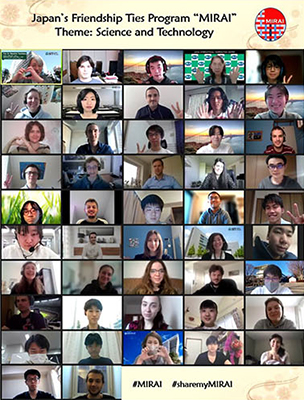 Online exchange with Shibaura Institute of Technology (April and May)
Online exchange with Shibaura Institute of Technology (April and May)Feedback from students that participated from Europe
- The time we spent with the Japanese university students was very meaningful, and I fully understood their way of thinking about Japanese society and culture. My understanding and affection for Japan became even deeper.
- I deepened my knowledge not only of Japan, but also European countries. I plan to write an essay on how I learned about issues from a range of perspectives.
- It was fascinating to learn with the Japanese students about how Edo (former name of Tokyo) - the city with the highest population in the 19th century - embraced the concept of mottainai (waste not, want not), and treasured all of its resources.
Tachibana Masahiko, Professor, Innovative Global Program, College of Engineering, Shibaura Institute of Technology (collaboration on university exchange)
The students from Europe showed great interest in Japanese traditions such as innovative long-standing Japanese companies and how Edo was a recycling and sustainable city. It seemed that the Japanese and European students learned a lot from each other through the program, and more than 90% of participants responded in a follow-up survey that they were “satisfied” with it. It was the biggest benefit for us to show that online programs work well enough as a platform for international exchange.
■MIRAI alumni networking events
Shokhrukh Sirojiddinov (participated from Uzbekistan in FY2015)
The MIRAI program marked my first exposure to Japan. I was personally impressed with the technological development and public etiquette among the Japanese. After participating in the MIRAI Program, I returned to Japan and studied there for three years. I had a job offer from a Japanese company and currently live and work in Tokyo. At a MIRAI Alumni event, I was chosen as one of the speakers to talk about my life and career in Japan for over 100 participants from European countries. Many participants reached out to me asking questions. I was happy to answer them and share my experience with fellow participants.
Claudia Bonillo Fernández (participated from Spain in FY2018)
My growing fascination with Japan made me want to deepen my research on its culture at an academic level, so I specialized in Japanese Studies at a university in Spain. Participating in this program allowed me to experience Japan in a deeper way, which reasserted my wish to learn much more about this culture and above all, to live there, which led me to do a research stay at Kyoto University. During my stay, I coordinated an online seminar on the topic of my doctoral thesis, supported and attended by Japanese and European universities, being a prime example of how one event has managed to connect different countries including Spain and Japan.
Antonio Meleca (participated from Italy in FY2019)
My experience as a MIRAI delegate allowed me to differentiate myself among many applicants for multiple high-level internships. I was able to do an internship within international organizations and join a youth-led think tank contributing to the research for EU-Asia/Pacific Studies. Thanks to these positive experiences, I decided to present my career path during the 2021 MIRAI reunion. The presentation allowed me to broaden my network and I ended up completely taking up the role of a MIRAI promoter through social media. I frequently find myself inviting my fellow interns to apply to the MIRAI program.
The continuation of online exchange has been an opportunity to learn thoughts about relations between Japan and Europe from each and every participant as well as to strengthen the bonds among them. The Ministry of Foreign Affairs of Japan will continue initiatives leading to a bright MIRAI (“future” in Japanese) between Japan and Europe.
(2) United Kingdom
Following the resurgence of COVID-19, lockdown measures were introduced for the third time in the UK from January to March. On the other hand, the UK approved COVID-19 vaccines at the end of 2020, ahead of the rest of the world, and proceeded with vaccinations, which temporarily contributed to enhancing the Johnson administration's approval rate. Since March 2021, the Government of the UK has relaxed restrictions in stages, and in July, amid rising numbers of infections, it's “living with COVID-19” policy was introduced by eliminating most of the restrictions. Additionally, the Johnson administration has been promoting initiatives for “levelling up” every part of the UK and reforming the health and nursing care systems. As part of the cabinet reshuffle in September, Elizabeth Truss, former Secretary of State for International Trade, was appointed as Secretary of State for Foreign, Commonwealth and Development Affairs.
In regard to Brexit, the Trade and Cooperation Agreement between the EU and the UK that was concluded on December 24, 2020 (and officially entered into force in May) and avoided the situation of tariffs being established between the UK and the EU. On the other hand, challenges remain in relations with the EU over the implementation of the Northern Ireland Protocol, fishing rights, and other issues.
On the security front, the UK has been strengthening its engagement in the Indo-Pacific region. In March 2021, it issued the Integrated Review of Security, Defence, Development and Foreign Policy, in which it positioned Japan as “one of our closest strategic partners, including on security.” As for Japan-UK relations, the UK carrier strike group centered on the UK's aircraft carrier HMSQueen Elizabeth made a port call to Japan in September, and various forms of joint exercises have been implemented. Bilateral security and defense cooperation have deepened dramatically in recent years, including the start of negotiations for a Japan-UK Reciprocal Access Agreement in October.
Dialogue and exchanges between Japan and the UK have been actively conducted at various levels, including at the summit and foreign minister level. During these, the two countries shared the view that Japan and the UK would promote cooperation toward the realization of FOIP, and they cooperated closely for G7 solidarity, regional situations, climate change countermeasures, and the like in light of the UK holding the G7 Presidency and Presidency for the 26th session of the Conference of the Parties to the United Nations Framework Convention on Climate Change (COP26) in 2021. Prime Minister Suga held telephone calls with Prime Minister Johnson in February and May, and held an in-person meeting during the G7 Cornwall Summit in June. Prime Minister Kishida also held a telephone call with Prime Minister Johnson in October and an in-person meeting during COP26 in November.
Foreign Minister Motegi held the Fourth Japan-UK Foreign and Defence Ministers' Meeting (“2+2”) online in February. He also held the Ninth Japan-UK Foreign Ministers' Strategic Dialogue in May, a Japan-UK Foreign Ministers' Meeting in June, and a telephone call in September with Secretary of State for Foreign, Commonwealth and Development Affairs Dominic Raab. In addition, he held a telephone call with Secretary of State for International Trade Truss in May, and again in September immediately after her appointment as State for Foreign, Commonwealth and Development Affairs. He also held an in-person meeting with her during the UN General Assembly in the same month. Foreign Minister Hayashi held an in-person meeting with Foreign Secretary Truss during the G7 Foreign Ministers' Meeting in December.
With regard to culture, in relation to the “Japan-UK Season of Culture,” the period which bridges the two major sports events of the Rugby World Cup 2019 and the Olympic and Paralympic Games Tokyo 2020, the “Japan Season of Culture” in the UK was extended until 2021 following postponement of many events resulted from the spread of COVID-19. Various related events were held throughout the year, mainly online.
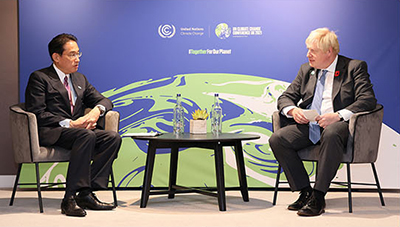 Japan-UK Summit Meeting (November 2, Glasgow, UK)
Japan-UK Summit Meeting (November 2, Glasgow, UK)(3) France
President Macron's approval rating, which rose due to his response to COVID-19, remained relatively high at around 40% in 2021. In France, infections spread again from the beginning of the year and strict measures were adopted, including a nationwide curfew. However, restrictions have been eased since June 2021, when vaccinations helped bring down the spread of infections. With a 100 billion euro economic recovery plan announced in September 2020, the Macron administration is working on the recovery of the damaged economy while responding to COVID-19. While effectively postponing pension reform in anticipation of the presidential election in April 2022, President Macron announced in a televised speech in November countermeasures against COVID-19, an energy policy that included the construction of new nuclear power plants, and the launch of a plan to strengthen investment to secure the country's technological and production capacity.
With respect to external affairs, France promoted engagement in the Indo-Pacific, including leading the formulation of the EU's Indo-Pacific Strategy. France also strengthened security and defense cooperation in the Indo-Pacific with Japan, including the training fleet “Jeanne d'Arc” which held the Japan-France-U.S.–Australia-India joint exercise in May, and the bilateral ground exercise between Japan and France which took place within Japan for the first time during a port call in Japan.
In addition, dialogues were held between Japan and France at various levels, including at the summit and foreign minister levels. In May, Foreign Minister Motegi met with Minister for Europe and Foreign Affairs Jean-Yves Le Drian, and they confirmed that they would work together to materialize the bilateral cooperation towards the realization of FOIP. In June, Prime Minister Suga met with President Macron during the G7 Summit, and they confirmed cooperation toward the success of the Olympic and Paralympic Games Tokyo 2020, held in 2021 as well as the Paris Games to be held in 2024. In July, Prime Minister Suga held a summit meeting and luncheon meeting with President Macron, who was the only leader of a major country to visit Japan to attend the opening ceremony of the Olympic and Paralympic Games Tokyo 2020. The leaders confirmed the promotion of bilateral cooperation in the Indo-Pacific and exchanged views on cooperation for global challenges such as climate change, biodiversity, and development in Africa. In September, during his visit to New York, Foreign Minister Motegi met with Minister for Europe and Foreign Affairs Le Drian and confirmed continued cooperation in the Indo-Pacific region. In November, Prime Minister Kishida held a telephone call with President Macron, in which he welcomed the significant strengthening of the bilateral security and defense cooperation, and shared the view to continue to work closely together. In the same month, Foreign Minister Hayashi also held a telephone call with Minister for Europe and Foreign Affairs Le Drian. In December, during the G7 Foreign Ministers' Meeting, they held an in-person meeting and shared the view to further deepen Japan-France cooperation in the Indo-Pacific.
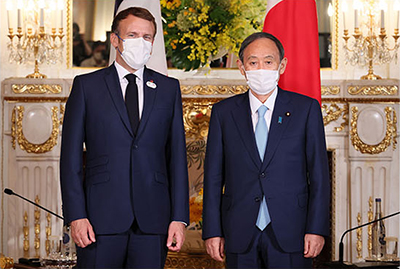 Japan-France Summit Meeting (July 24, Tokyo)
Japan-France Summit Meeting (July 24, Tokyo)(4) Germany
The Bundestag election held on September 26 attracted a great deal of attention as the election to determine the successor to Chancellor Angela Merkel, who had announced her decision not to run in the election. Until 2020, under the leadership of Chancellor Merkel, the response to COVID-19 was highly evaluated, and the Christian Democratic Union and Christian Social Union (CDU/CSU) had a high approval rating. However, from the beginning of 2021, the approval rating rose for the Social Democratic Party (SPD) candidate Olaf Scholz as the CDU chancellor candidate, Armin Laschet, lost ground due to the response to flooding in western Germany and the scandal involving false statements on the resume of Green Party chancellor candidate, co-chair Annalena Baerbock. As a result, the SPD became the leading party (25.7%, an increase of 5.2% compared to the previous election), the CDU/CSU came in second but with the lowest turnout since its formation (24.1%, a decrease of 8.8%), and the Green Party came in third (14.8%, an increase of 5.9%). Coalition negotiations between the parties continued after the election. On November 24, the SPD, Green Party, and Free Democratic Party (FDP) reached a consensus on a coalition agreement. On December 8, the new administration (the so-called “traffic light coalition”) was inaugurated with former Vice Chancellor and Federal Minister of Finance Scholz as Prime Minister. Attention is being paid to administration operations after Former Chancellor Merkel, who had led the government for 16 years since 2005, steps down.
With regard to Japan-Germany bilateral relations, high-level exchanges continued in 2021, the 160th anniversary of the establishment of Japan-Germany relations, in the form of summit meetings and foreign ministers' meetings, both in person and by telephone. In addition, the Japan-Germany Agreement on the Security of Information was signed in March, and the first Japan-Germany Foreign and Defense Ministers' Meeting (“2+2”) was held online in April. In November, the German naval frigate “Bayern,” which was dispatched to the Indo-Pacific region under Germany's “Indo-Pacific Guidelines” established in September 2020, paid a port call to Japan and conducted a joint exercise. Japan-Germany relations have thus been strengthened, centered on the security field.
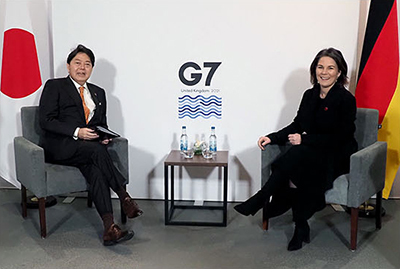 Japan-Germany Foreign Ministers' Meeting (December 11, Liverpool, UK)
Japan-Germany Foreign Ministers' Meeting (December 11, Liverpool, UK)(5) Italy
In January, a vote of confidence on the Conte administration was held in both the Chamber of Deputies and Senate of the Republic after one of the ruling coalition parties broke away due to conflicts over the European Stability Mechanism and the European recovery funds. Although the vote passed in both houses, the administration could not receive an absolute majority in the Senate of the Republic, and Prime Minister Conte announced his resignation. President Sergio Mattarella called on all the political parties to give confidence to a non-party cabinet to deal with the emergency situation, and a new broad coalition government was formed in February 2021 with former European Central Bank President Mario Draghi inaugurated as Prime Minister. Prime Minister Draghi enjoys a high approval rating because of the concrete results he has achieved regarding his administration's priorities of the promotion of vaccination and the use of the European recovery funds.
In regard to COVID-19, the number of infections had been on the decline since late November 2020, but began to increase in late February. After peaking in late March, infections began to decline again as vaccination progressed. Since late April, restrictions on the use of theaters, gyms, and other facilities have been gradually eased, and in late June, restrictions were lifted throughout Italy. Due to the rapid progress of vaccination, the majority of the population has completed the second dose, and the government is implementing efforts for the third dose. In October, a measure requiring all workers to have vaccination certificates and employers to confirm possession of such certificates came into effect. However, protests against the measure broke out, and there were clashes between some rioters and the police.
As for Japan-Italy relations, Prime Minister Suga held a telephone call with Prime Minister Draghi in March, confirming cooperation with Italy, which held the G20 Presidency. Foreign Minister Motegi held meetings with Minister of Foreign Affairs and International Cooperation Di Maio during the G7 Foreign and Development Ministers' Meeting in May and the G20 Foreign and Development Ministers' Meeting in June. They confirmed the strengthening of cooperation for addressing global challenges such as recovery from the COVID-19 pandemic and climate change, as well as for the realization of FOIP. Foreign Minister Hayashi also met with Minister Di Maio during the G7 Foreign Ministers' Meeting in December.
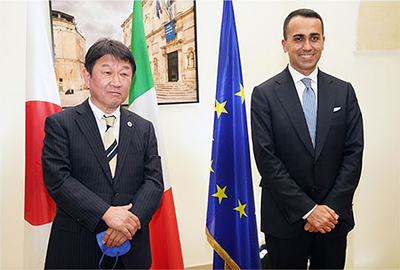 Japan-Italy Foreign Ministers' Meeting (June 29, Bari, Italy)
Japan-Italy Foreign Ministers' Meeting (June 29, Bari, Italy)(6) Spain
The second administration of Prime Minister Pedro Sánchez, inaugurated in January 2020, is governed by a minority ruling coalition government in cooperation with various parties outside the cabinet. The government has achieved a high vaccination rate, and it is also focusing on economic measures that will continue even after COVID-19 is contained, using recovery funds distributed by the EU. The administration has maintained a certain level of approval since the outbreak of COVID-19.
In regard to Japan-Spain relations, the two countries are closely cooperating in the international arena, while strengthening bilateral relations in various fields, including politics, economy, and culture, under the strategic partnership agreed upon at the summit level meeting in 2018. In March, an interim meeting of the Japan-Spain Symposium, which aims to promote mutual understanding and strengthen cooperation between the two countries, was held online. Another meeting was held in a hybrid format in December. In addition, cooperation was promoted in both the public and private sectors in the fields of the economy, science and technology, among others, including the entry into force of the new Japan-Spain tax convention in May, and the third Meeting of the Japan-Spain Joint Committee on Cooperation in Science and Technology being held in June.
(7) Poland
The coalition government established in 2015, led by the ruling Law and Justice (PiS) party, continues to govern with relative stability against the backdrop of a strong economy and generous welfare policies. Although support for the Morawiecki administration temporarily declined due to the effects of COVID-19, the economic impact was limited compared to other European countries, and support for the administration has been recovering along with economic recovery.
In regard to Japan-Poland relations, Foreign Minister Motegi visited Poland in May and held a Foreign Ministers' Meeting with Foreign Minister Rau. At the meeting, they confirmed the policy of strengthening cooperation in various fields, including politics, economy, and culture, through the signing of the Action Plan for the Implementation of the Strategic Partnership between Japan and Poland (2021-2025). In addition, the 7th “V4 plus Japan” Foreign Ministers' Meeting was held under the Polish Presidency, in which the ministers agreed to advance cooperation with the V4 for FOIP and to support the Western Balkans. Furthermore, in July, President Duda visited Japan on the occasion of the opening ceremony of the Olympic Games Tokyo 2020. During the summit meeting with Prime Minister Suga, they exchanged views on FOIP and the “Three Seas Initiative” led by Poland, and agreed to further deepen the strategic partnership between the two countries.
(8) Ukraine
The situation in eastern Ukraine, which had been unstable since 2014, had been relatively calm since the cease-fire agreement in July 2020. However, the situation began to deteriorate again around February 2021. In the first half of April, concerns increased about the buildup of Russian military forces, particularly around Ukraine's eastern border. During the second half of April, Russia ordered its troops to return to their original bases, and the situation appeared to have reached a lull. However, from the second half of October, the Russian military buildup around the Ukrainian border was again confirmed. In December, at the G7 Foreign Affairs and Development Ministers' Meeting, a statement was issued calling on Russia to ease tensions and pursue dialogue through diplomatic channels. Despite continued diplomatic efforts, including two U.S.-Russia videoconference summit meetings in December, there were no signs of improvement during 2021.
The situation became even more tense in 2022. While Russian forces were further reinforced, especially in the areas near the Ukrainian border, diplomatic negotiations continued among various countries to reduce tensions, including at the G7 Foreign Ministers' Meeting held on February 19. However, Russia's aggression began on February 24, when President Putin announced the start of a “special military operation” in pursuit of “demilitarization” and “denazification” in Ukraine, claiming that the purpose of the operation was to “protect people who have been subjected to genocide” by the Government of Ukraine. On the same day, Japan issued a Statement by Foreign Minister in which it condemned Russia's actions in the strongest terms. In addition, at the G7 Summit Teleconference Meeting, a G7 Leaders' Statement was issued condemning Russia's aggression against Ukraine in the strongest possible terms. Furthermore, on February 25, Foreign Minister Hayashi held a telephone call with Foreign Minister Kuleba, and conveyed Japan's readiness to urgently provide assistance to Ukraine through loans of at least 100 million US dollars, and stated that sanctions against Russia would be implemented promptly. On February 28, Prime Minister Kishida held a telephone call with President Zelenskyy, in which he stated that Japan would impose further sanctions on Russia. Prime Minister Kishida also conveyed that in addition to the loans already announced, Japan would provide 100 million US dollars in emergency humanitarian assistance to the Ukrainian people who were facing hardship in Ukraine and neighboring countries. President Zelenskyy expressed his high appreciation and deep gratitude to Japan for these efforts.
On February 28, the first round of talks between Ukraine and Russia was held in Gomel Oblast near the Ukrainian border in southeastern Belarus. The Russian side made demands such as the confirmation of Ukraine's status as a neutral country with demilitarization as a prerequisite and recognition of Russia's jurisdiction over Crimea. The future of the negotiations is unpredictable.
Russia's recent aggression against Ukraine is an attempt to unilaterally change the status quo by force. It is an outrageous act that shakes the very foundation of the international order, not only in Europe but also in Asia, a serious violation of international law, and completely unacceptable. This is a matter that also concerns Japan's own security. Japan will act in solidarity with Ukraine and unity with the international community, including the G7, in order to resolutely defend the international order.
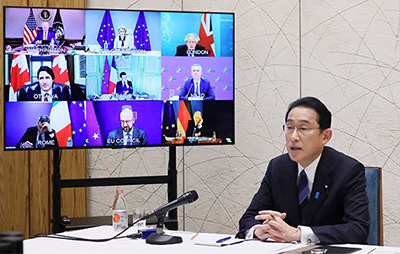 Prime Minister Kishida attending the G7 Summit Teleconference Meeting (February 24, 2022, Tokyo; Photo: Cabinet Public Relations Office)
Prime Minister Kishida attending the G7 Summit Teleconference Meeting (February 24, 2022, Tokyo; Photo: Cabinet Public Relations Office)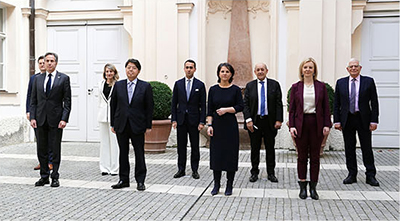 G7 Foreign Ministers' Meeting (February 19, 2022, Germany)
G7 Foreign Ministers' Meeting (February 19, 2022, Germany)
